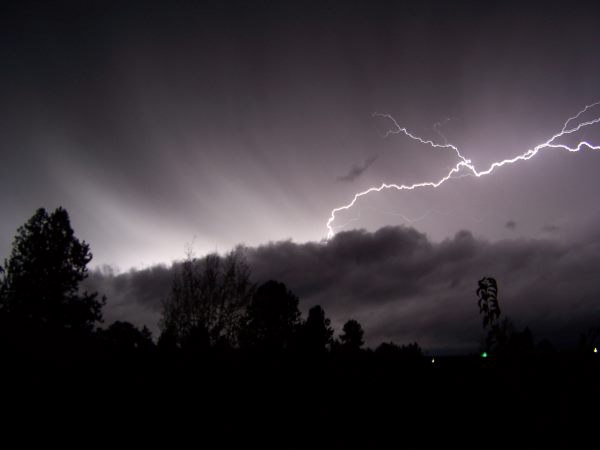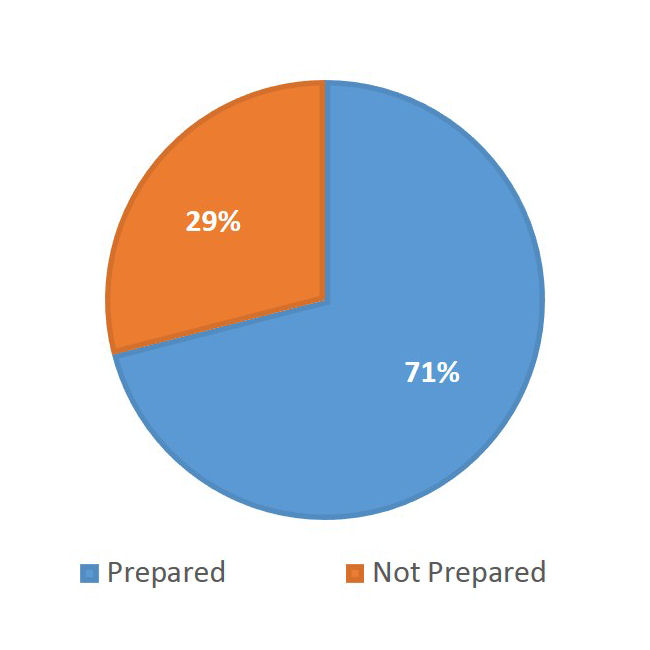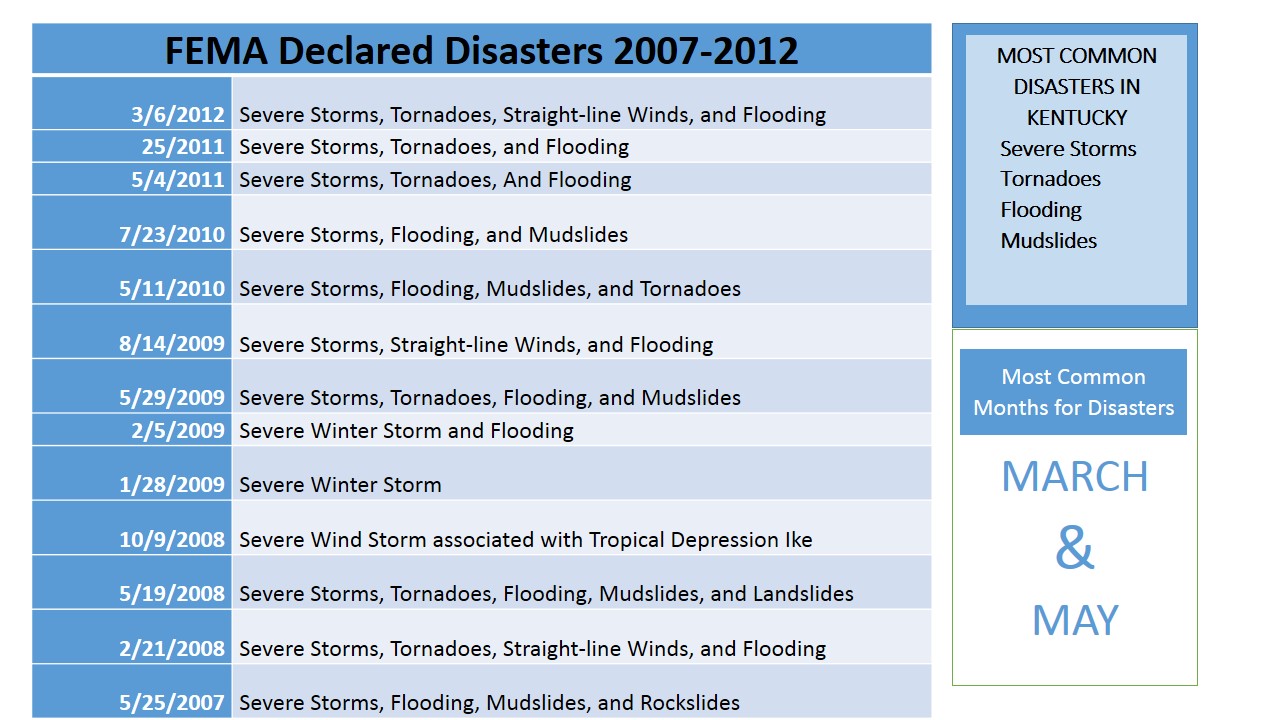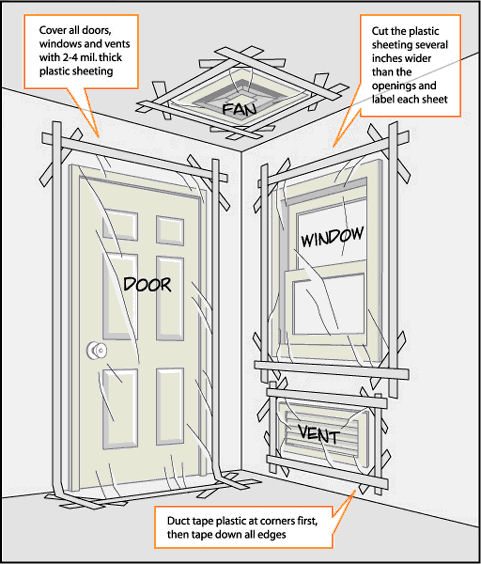We are all glued to our television sets when tornadoes rip through Mississippi, or hurricanes plow over Florida. We cannot take our eyes off earthquakes in California, or mudslides in Washington, but what happens when the disaster is not just on television, but in our own backyard.

When Mother Nature shows her bad side, it is too late to prepare. Emergencies can happen anywhere and anytime, even where you live, and there's nothing you can do about it except to prepare yourself and your family.
That is why it's important to know how to prepare when the skies are clear and what steps to take to protect your home, business, and community when emergencies threaten.
Are You Prepared?
 During the 2009 National Conference on Community Preparedness, the Federal Emergency Management Agency (FEMA) released a new report Personal Preparedness in America: Findings from the 2009 Citizen Corps National Survey. This survey shows public thoughts, perceptions, and behaviors related to preparedness and community safety.
During the 2009 National Conference on Community Preparedness, the Federal Emergency Management Agency (FEMA) released a new report Personal Preparedness in America: Findings from the 2009 Citizen Corps National Survey. This survey shows public thoughts, perceptions, and behaviors related to preparedness and community safety.
Results from the national survey indicate that 29 percent of Americans have not prepared because they think that emergency responders will help them. Over 60 percent expect to rely on emergency responders in the first 72 hours following a disaster. Of course, FEMA will execute to its fullest capability, but reality has shown that under the worst circumstances, it is nearly impossible to assist 6-60 percent of the population within three days.
Even among those who thought they were prepared, 35 percent did not have a household plan, and nearly 75 percent had not conducted a home evacuation drill, nor did they know their communities evacuation routes. Across the nation, most people are unprepared and even those who think they are ready, most likely are not.
The more realistic approach is to understand that preparedness starts at home, and if each individual prepares to care for themselves and their family, the outcomes of disaster may be much more optimistic. Preparing your home and your family for any type of disaster is critical to your safety and survival.
Disaster in Kentucky
Kentucky is relatively safe from most natural disasters, and yet, we face many weather related and man-made challenges throughout the year; from tornadoes, flooding, straight line winds, lightning winter storms, hazardous chemical spills to daily emergencies. From 2007-2012, a FEMA disaster has been declared at least once per year in the state.

Step 1 - Awareness
You cannot be adequately prepared for risks if you do not understand what risks you face. Know what the history of disasters is in your area, and what risks are in the community. Watch the news and pay attention to weather warning and weather watches.
Keep a backup radio for local broadcasts in case the cable goes out in the course of a disaster. Keep your family aware of risks as well. This can be a scary discussion for children, but it is better that they understand the possibilities rather than being completely panicked and unprepared.
Step 2 – Preparedness
The most basic level of preparedness is to have a three-day supply of food, water, and supplies on hand for each family member. Commonly referred to as a 72-hour kit, this is a simple concept that everyone in the family can participate in.
Make an individual kit in a backpack or duffle bag for each family member, teach older children to be responsible for their own bag. Use the following as a basic list to begin to pack your kits. Be sure to include items specifically for the ages and special needs of your children such as small toys, medication, baby formula, etc.
Food and Water Requiring No Cooking
-
Protein/Granola Bars/Trail Mix
- Canned Tuna, Beans, Turkey, Beef,
-
Canned Juice
-
1 Gallon Water per person
Bedding and Clothing
-
Change of Clothing (for any season)
-
Poncho/Emergency Heat
-
Cloth and Plastic Sheet
Fuel and Light
- Battery Lights and Batteries
-
Candles
-
Lighter
-
Water-Proof Matches
Equipment
-
Can Opener
-
Shovel
-
Radio (with batteries!)
-
Axe
-
Pocket Knife
-
Rope
-
Duct Tape
Personal Supplies and Medication
-
Toiletries
-
Small Cleaning Supplies
-
Medication and Prescriptions
-
Insurance Policies
-
Cash
-
Credit Card
-
Pre-Paid Phone Cards
Update your 72 Hour Kit every six months to make sure that everything is fresh, up-to-date, charged, food has not expired, and clothing fits.
Step 3: Planning
Having an emergency kit is a great start, but having a plan is the second step. A plan should answer all of the questions you should have if an emergency hits. Where will your family meet? What do we do if we cannot find each other? How do we escape the house?
Make a plan and discuss it with your family, review the plan periodically, especially with children. Having a plan makes children feel empowered, rather than scared. Practice the plan with children.
Shelter and Evacuation
When your area is threatened, an evacuation recommendation or an evacuation order is often imminent. Follow these evacuation directions provided by lexingtonky.gov:
-
Leave immediately if instructed to do so.
-
Turn off all appliances. Lock your doors and windows.
-
Bring along your emergency kit
-
Wear sensible clothing and sturdy shoes that are appropriate for the weather.
-
Use travel routes specified by local officials. Do not use shortcuts because certain areas may be impassable or dangerous.
-
Call your family contact and tell them where you are.
-
Do not return home until officials give the "ALL CLEAR" message to do so.
After an evacuation:
-
Use caution when entering your home.
-
Open doors and windows to move around air in your home.
-
DO NOT strike a match or turn on electric lights until you are sure there are no leaks in gas lines.
Preparing Your Shelter
Sometimes, there may not be time to evacuate. This is when it is time to prepare your own shelter the best you can to protect yourself and your family. Tornadoes are one of the major risks in Kentucky and an average of 42 people die in the United States from tornadoes each year.
Most of these individuals remained in their homes, directly in the path of the storm. If you live in a high-risk area, have a safe room built into or next to your home if possibl
Evacuation is useless when the emergency including the accidental release of hazardous chemicals into the air, ground, or water. Use this diagram to "shelter-in-place" and create a temporary protection when evacuation is not possible.

After the Storm
There are innumerable resources for preparing yourself and your family for an emergency. Be proactive by researching, preparing, packing, and planning. Understand the needs of your family and keep things organized so you are ready at a moment's notice
After the storm has cleared, many insurance companies may set up temporary offices to handle the large quantity of claims filed. Understand that insurance companies know you need their help, and they will do everything they can to remain accessible to you and your family.
You may be directed to a different office if your local office is damaged or unusable. In the meantime, take pictures (keep a disposable camera in your 72-hour kit), keep an inventory of damaged items (keep a pen and paper in your 72-hour kit), and most of all, take care of yourself and your family.
Being prepared allows you to focus on the basic food, clothing, and shelter needs of your family while the insurance company focuses on getting life back to normal.
By Matt Reynolds - Google+